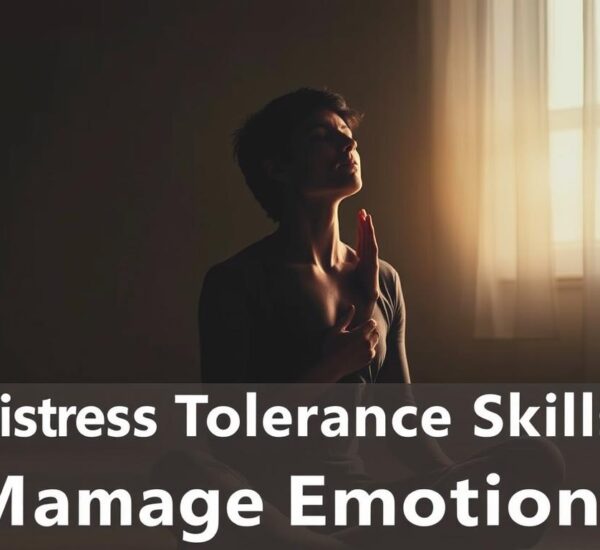We know that everyone’s path to well-being is different. That’s why we focus on personalized counseling solutions. At Wellness Counseling LLC, we create treatment plans that fit each person’s needs.
Our therapy approach is all about giving care that really listens. We help people deal with mental health issues like depression, anxiety, and trauma. By focusing on personal therapy, we help people take charge of their mental health and improve their lives.
We believe the right support can help people overcome their challenges. Our goal is to create a safe, supportive space. Here, people can share their concerns and work with our team to find effective ways to cope.
Key Takeaways
- Personalized counseling solutions are key for good mental health care.
- Treatment plans are made to meet each person’s unique needs.
- Therapy can help with depression, anxiety, and trauma.
- A supportive environment is vital for healing and growth.
- Working together with professionals leads to better results.
Understanding Counseling: What You Need to Know
Understanding counseling can lead to a more fulfilling life. It offers solutions to many mental health issues. Counseling, or therapy, is a process where people work with a trained therapist to tackle their challenges.
Definition and Importance of Counseling
Counseling is a professional service that helps people manage their mental health and emotional well-being. It’s key for those facing daily challenges, relationship problems, or overall well-being issues. Counseling provides a supportive space to explore feelings, thoughts, and behaviors without fear of judgment.
Counseling services do more than just help in crises. They also teach strategies for maintaining mental wellness. By seeking counseling, people can learn coping skills, improve relationships, and enhance their life quality.
Different Types of Counseling
There are many types of counseling, each for different needs. Individual counseling deals with personal issues. Marriage counseling helps couples overcome relationship challenges. Family counseling involves the whole family to address dynamics and communication. Group therapy offers support to those facing similar issues.
The rise of online counseling platforms, like Find My Therapist, has made counseling more accessible. Online counseling allows for sessions from home, making it convenient for many.
| Type of Counseling | Description | Benefits |
|---|---|---|
| Individual Counseling | One-on-one therapy sessions focusing on personal issues. | Personalized approach to address specific challenges. |
| Marriage Counseling | Couples therapy to improve relationship dynamics. | Enhanced communication and conflict resolution skills. |
| Family Counseling | Therapy involving the entire family unit. | Improved family dynamics and understanding. |
| Group Therapy | Group sessions for individuals with similar challenges. | Supportive community and shared experiences. |
Who Can Benefit from Counseling?
Counseling helps anyone facing mental health issues, relationship problems, or significant life changes. Whether it’s anxiety, depression, or just wanting to improve well-being, counseling services offer the support and guidance needed.
In conclusion, counseling is a versatile and effective tool for better mental health and well-being. Understanding the different types and their benefits helps individuals make informed decisions about seeking help.
Common Issues Addressed in Counseling
Counseling helps with many everyday problems. It offers a safe place for people to face their challenges with a professional’s help.
Anxiety and Stress Management
Anxiety and stress are big issues for many. Individual counseling teaches ways to handle these feelings. Mindfulness, CBT, and relaxation exercises are some of the methods used.
Studies show these techniques work well:
| Technique | Description | Effectiveness |
|---|---|---|
| Mindfulness | Focuses on being present in the moment | High |
| CBT | Helps change negative thought patterns | High |
| Relaxation Exercises | Techniques to calm the mind and body | Moderate |
Depression and Emotional Wellness
Depression can deeply affect a person’s life. Counseling, including family counseling, is key in managing depression. It helps people understand their feelings and improve their relationships.
Relationship and Family Challenges
Relationship problems are common. Family counseling helps families talk better, solve conflicts, and bond stronger. Counselors help find the root of problems and find solutions.
Career Counseling and Life Transitions
Many seek career counseling during big life changes. Counselors guide on career paths, help find interests and skills, and support in making career choices.
Counseling tackles many issues, like anxiety, depression, family problems, and career changes. It offers a supportive and safe space for growth and healing.
The Counseling Process: What to Expect
The counseling process is a team effort between you and your counselor. It’s designed to help you deal with life’s tough times. At Wellness Counseling LLC, we offer a safe and understanding space. Here, you can talk about your feelings, find out what stresses you, and learn ways to feel better.
Initial Consultation and Assessment
The first step is usually an initial consultation. This is when you and your counselor talk about why you’re seeking help. It’s a chance for you to share your worries and for the counselor to get to know your needs. Then, the counselor will do an assessment to figure out what needs to be worked on.
In the assessment, the counselor might use questionnaires or interviews. This helps them understand your mental health and wellbeing better. With this info, they can make a treatment plan just for you.
Developing a Treatment Plan
After the assessment, you and your counselor will create a treatment plan together. This plan will outline how to reach your goals. You’ll be a big part of making this plan, working together every step of the way.
The plan might include things like cognitive-behavioral therapy or mindfulness. The counselor will explain these methods and how they can help you.
Ongoing Sessions and Techniques Used
Regular counseling sessions are key to the process. In these sessions, you and your counselor will work on the treatment plan. They might use cognitive-behavioral therapy to help with anxiety or depression.
They might also give you exercises or homework to practice what you’re learning. These tasks help you apply what you’ve learned and reach your goals faster.
Benefits of Personalized Counseling
Personalized counseling is a tailored approach to mental health. It addresses individual needs with precision. This method of therapy is recognized for its effectiveness in supporting mental wellness.

Tailored Strategies for Individual Needs
Personalized counseling offers tailored strategies for each person’s unique challenges and goals. It’s different from a one-size-fits-all approach. The techniques and methods used are chosen to meet the client’s specific needs.
Online counseling is a flexible and accessible option. It allows individuals to get support from home. This is great for those with busy schedules or living far away.
Improved Mental Health and Coping Skills
Personalized counseling aims to improve mental health. It teaches individuals healthier coping mechanisms. Through counseling services, people can manage stress, anxiety, and other mental health challenges better.
Working with a counselor helps identify the root causes of mental health issues. It also helps develop strategies to overcome them. This improves mental health and overall well-being.
Building Resilience and Personal Growth
Personalized counseling also fosters resilience and promotes personal growth. It addresses specific challenges and develops coping strategies. This builds resilience and prepares individuals to handle life’s challenges.
The supportive environment of counseling allows for exploring one’s full capacity. It helps set and achieve personal goals. This leads to significant personal growth and a more fulfilling life.
In conclusion, personalized counseling offers many benefits. It includes tailored strategies, improved mental health, increased resilience, and personal growth. Whether through in-person sessions or online counseling platforms, its flexibility and effectiveness make it a valuable resource for mental health support.
Choosing the Right Counselor for You
Finding a counselor who gets you is key to effective therapy. The right one offers a safe space to explore and grow. Here, you can tackle challenges and aim for your goals.
Qualifications and Credentials to Look For
When looking for a counselor, check their qualifications. Make sure they have a degree in psychology or social work. Also, verify if they are licensed in their state. Relevant certifications and experience with your issues are important too.
| Credential | Description | Importance |
|---|---|---|
| Licensure | Legal permission to practice counseling | High |
| Certifications | Specialized training in areas like CBT or family therapy | Medium to High |
| Experience | Years of practice and success with clients with similar issues | High |
Questions to Ask During Your First Meeting
The first meeting is a chance to see if the counselor is right for you. Prepare questions about their therapy style, experience with your issues, and what sessions will be like. Ask about their success rates and how they measure progress.
- What experience do you have with my specific issues?
- What therapeutic approaches do you use?
- How will we track my progress?
Trusting Your Instincts: Finding the Right Fit
Choosing a counselor is a personal decision. Trust your instincts about feeling comfortable and understood. A good counselor will create a therapy plan that fits your needs. This could be individual counseling or family counseling for mental health support.
The Role of Technology in Counseling
Technology has changed how we deal with mental health. Now, counseling services are easier to get and more varied thanks to digital platforms.
Technology is key in changing how we get counseling. Online counseling is becoming more popular. It’s seen as a better option than meeting in person for many.
Online Counseling: Pros and Cons
Online counseling uses video calls, phone, or messaging apps for sessions. It’s great for those who can’t travel or have busy schedules. It also lets people choose when to meet.
But, there are downsides. Internet problems can mess up sessions. Some people struggle to connect with their counselor online.
Key Benefits of Online Counseling:
- Increased accessibility
- Flexibility in scheduling
- Comfort and privacy for the client
Apps and Tools for Mental Health Support
There are many apps and tools for mental health. They include mindfulness apps and mood trackers. Mental health apps help people manage their mental health between sessions.
Apps like Headspace and Calm offer meditation. Moodfit and Daylio help track feelings and symptoms.
| App Name | Primary Function | Key Features |
|---|---|---|
| Headspace | Meditation and Mindfulness | Guided meditations, personalized progress tracking |
| Calm | Meditation and Relaxation | Guided meditations, sleep stories, relaxing music |
| Moodfit | Mood Tracking | Mood tracking, activity monitoring, personalized insights |
How to Maintain Privacy in Digital Counseling
Keeping information private is very important in online counseling. Counselors and clients must use secure platforms and encrypt data.
Clients should pick a quiet, private spot for sessions. Secure communication practices are vital to keep information safe.
Knowing the good and bad of online counseling, using mental health apps wisely, and keeping things private can help a lot. This way, technology can really help in counseling.
Overcoming Stigmas Associated with Counseling
The stigma around counseling stops many from getting help. Despite growing mental health awareness, old myths keep people from seeking counseling. We need to change this.
Understanding Common Misconceptions
Some think counseling shows weakness or is only for serious mental health issues. But, counseling services help anyone facing stress, anxiety, or other problems. Knowing these myths helps us fight the barriers to seeking help.
Promoting Mental Health Awareness
It’s key to fight counseling stigma by spreading mental health awareness. We can do this by teaching the public about counseling’s benefits and mental wellness. Online counseling and marriage counseling are services that can be made more normal through awareness.
Sharing Personal Stories and Experiences
Sharing our stories can make counseling seem like a sign of strength, not weakness. By sharing, we build a supportive community. This community encourages others to seek help without fear.
Wellness Counseling LLC is a great example. They offer a safe space for people to talk about their feelings and emotions.
By fighting counseling stigma, we help more people feel okay about getting help. It’s a team effort that needs understanding, awareness, and openness.
Family and Couples Counseling Overview
Family and couples counseling is key for those wanting better relationships and well-being. It tackles communication issues and more. This helps build stronger, more resilient bonds.
Importance of Communication in Relationships
Good communication is the base of any healthy relationship. When both can speak clearly and listen well, they solve problems faster. They also understand each other’s needs and feelings better.
Open and honest talk stops misunderstandings. It builds trust and respect. In counseling, therapists work on improving how people communicate to handle tough situations.

Techniques Used in Family Counseling
Family counseling uses many methods to meet each family’s needs. Some common ones are:
- Structural Family Therapy, which looks at the family’s structure and how it works.
- Strategic Family Therapy, which targets specific family problems.
- Narrative Therapy, which changes how family members see their experiences.
| Therapy Type | Description | Benefits |
|---|---|---|
| Structural Family Therapy | Focuses on family structure and dynamics | Improves family organization and communication |
| Strategic Family Therapy | Identifies and addresses specific family problems | Resolves conflicts and improves problem-solving skills |
| Narrative Therapy | Reframes family experiences and perceptions | Promotes new perspectives and understanding |
When to Seek Couples Counseling
Couples counseling is helpful at any relationship stage. It’s good for communication issues, infidelity, or other problems. Counseling offers a safe space to tackle your issues together.
Some signs you might need counseling include:
- Frequent arguing or feeling distant from your partner.
- Struggling to solve conflicts or stuck in a bad pattern.
- Thinking about splitting up but wanting to try to fix things.
By going to couples counseling, you and your partner can understand each other better. You can work together to make your relationship stronger and more fulfilling.
How to Prepare for Your Counseling Sessions
Getting ready for mental health counseling is key to getting the most out of it. Being prepared helps you make the most of your sessions. This way, you can reach your mental health goals faster.
Remember, preparation is different for everyone. It depends on your unique needs and goals.
Setting Goals for Your Counseling Journey
Setting clear goals is a big step in your counseling journey. It helps you and your counselor know what you want to achieve. This makes your sessions more focused.
Tips for Setting Goals:
- Identify specific areas you want to improve.
- Make sure your goals are realistic and achievable.
- Communicate your goals clearly to your counselor.
Journaling and Self-Reflection Exercises
Journaling and self-reflection are great tools for your counseling. They help you understand yourself better. You can learn more about your thoughts, feelings, and experiences.
Benefits of Journaling:
- Helps in tracking your progress.
- Enhances self-awareness.
- Provides a safe space to express your emotions.
Being Open and Honest with Your Counselor
Being open and honest with your counselor is key to success. It lets your counselor understand you better. This way, they can help you more effectively.
Why Openness Matters:
- Facilitates a stronger counselor-client relationship.
- Enables your counselor to tailor the therapy to your needs.
- Enhances the overall effectiveness of the counseling process.
Counseling for Specific Populations
It’s key to know what different groups need in therapy. Each group has its own challenges that need special care.
Children and Adolescents
Counseling for kids and teens tackles issues like anxiety, bullying, and self-esteem. Play therapy and cognitive-behavioral therapy are common methods. They help young people learn to cope and boost their mental health.
Important parts of counseling for this age include:
- Creating a safe and non-judgmental space
- Using methods that fit their age
- Getting parents or guardians involved
LGBTQ+ Inclusive Counseling Approaches
Counseling for LGBTQ+ folks needs a deep grasp of their unique struggles, like discrimination and identity issues. Counselors must make a welcoming space that honors the person’s identity.
Key parts of LGBTQ+ inclusive counseling are:
- Using the right words and terms
- Knowing how stigma affects them
- Being up-to-date on LGBTQ+ issues and resources
Culturally Sensitive Counseling Practices
Culturally sensitive counseling is vital for helping diverse groups. It means understanding the cultural details and values of those being counseled.
Important practices include:
- Being aware of one’s own cultural biases
- Learning about the client’s cultural background
- Adjusting counseling methods to fit their culture
By using these methods, counselors can better support diverse groups. This makes counseling services more effective.
The Future of Counseling: Trends and Insights
The future of counseling is changing fast. New trends and insights are making a big impact on mental health support. These changes are adapting to the needs of people and society.
New therapies and techniques are emerging. For example, personalized therapy is gaining importance. The Lake Orion Counseling Center is leading the way with tailored guidance for each person’s unique challenges.
New Approaches in Therapy
New therapies focus on the whole person – mind, body, and spirit. Mindfulness, cognitive-behavioral therapy (CBT), and art therapy are being used more. They offer a deeper way to support mental health.
- Mindfulness practices to reduce stress and increase self-awareness
- CBT to address negative thought patterns and behaviors
- Art therapy to express emotions and foster healing
The Impact of Social Media
Social media is changing mental health in big ways. It can be good for connection but also bad for feelings of isolation and anxiety. Counselors are teaching clients how to use social media healthily.
Shifts in Public Perception
More people now see the value of mental health support. This shift is making counseling more accepted. There’s a growing focus on family counseling and individual counseling for overall wellness.
Counseling will keep evolving with new technologies and therapies. By embracing these changes, we can better support individuals and families. This will help build a healthier society.
Resources for Seeking Counseling Help
Seeking counseling is a big step towards better mental health and well-being. Finding the right resources can feel overwhelming. But, there are many options to help you on your counseling journey.
Local Counseling Services
If you prefer face-to-face therapy, local services are a good choice. For example, Wellness Counseling LLC offers personalized help. You can call them or use their online form to book a meeting.
Online Directories and Hotlines
Online directories and hotlines give quick access to mental health help. They connect you with experts in different therapy areas. This way, you can find the perfect match for your needs.
Community Resources and Support Networks
Community resources and support networks are key for mental health. They offer a sense of belonging and understanding. They provide extra guidance and support during your counseling.
By checking out these resources, you can actively improve your mental health through counseling and therapy.
## FAQ
### Q: What is counseling, and how can it help me?
A: Counseling is a supportive process that helps with mental health issues like depression and anxiety. We offer personalized solutions to improve your well-being. Our counselors create a treatment plan that fits your needs.
### Q: What types of counseling are available?
A: We have individual, family, and group therapy. Our counselors help with relationship issues and mental health. We also offer online counseling for easy access.
### Q: How do I choose the right counselor for my needs?
A: Look at their qualifications and experience. Ask questions during your first meeting. Trust your instincts to find a supportive counselor.
### Q: What can I expect during the counseling process?
A: It starts with a consultation and assessment. Then, a treatment plan is made. Our counselors use techniques like cognitive-behavioral therapy to help you.
### Q: Is online counseling as effective as in-person counseling?
A: Yes, research shows online counseling works well for many. It’s convenient and accessible. We ensure your privacy and security online.
### Q: How can I prepare for my counseling sessions?
A: Set goals and practice journaling. Be open and honest with your counselor. Active participation is key to personal growth.
### Q: Can counseling help with specific issues like anxiety or depression?
A: Yes, counseling can help with anxiety and depression. Our counselors provide personalized support and strategies.
### Q: Is counseling only for individuals, or can couples and families benefit too?
A: Counseling helps individuals, couples, and families. We offer services to improve communication and strengthen relationships.
### Q: How can I overcome the stigma associated with seeking counseling?
A: We promote mental health awareness. Sharing your story helps create a supportive environment. It’s okay to seek help.
### Q: Are there counseling services available for specific populations, such as children or LGBTQ+ individuals?
A: Yes, we have services for children, adolescents, and LGBTQ+ individuals. Our counselors provide culturally sensitive care.



